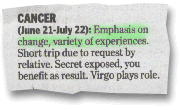March 19, 2001
Unearthing Family Assets
In the last couple of months I’ve been unearthing some family assets. Since my father’s death last October, I have been writing profusely about our relationship. He was a secretive man and found a place in an equally secretive job, as part of the legendary Skunkworks at Lockheed. So conducting family archeology or sleuthing (each apt metaphors for the process) has taken up a good deal of my free time of late.
In the five months since his death, I have been piecing together his and our family’s lives. Dad never talked about his early years. It was up to my sister and me to figure these things out, based more on how he lived than on any storytelling on his part. Every so often, we’d receive clues during chance encounters with relatives.
Dad’s motivations often seemed incongruous and any questioning on our part was met with deflection. I was to discover that death has a way of releasing the energy it’s taken in life to hold on to these secrets. As puzzle pieces are being put in their proper place I am reminded of a Yiddish proverb which proclaims “a son wants to know what a father wants to forget.”
 A month or so ago an article appeared in the Washington Post on a collection of 1950s and 1960s television shows now being housed at the Library of Congress (LOC). I contacted the curator mentioned in the article to see if they might have copies of a program called It Could Be You. This was sort of a “this is your life” of the unknown set. Sometime during its run my mother was a featured guest.
A month or so ago an article appeared in the Washington Post on a collection of 1950s and 1960s television shows now being housed at the Library of Congress (LOC). I contacted the curator mentioned in the article to see if they might have copies of a program called It Could Be You. This was sort of a “this is your life” of the unknown set. Sometime during its run my mother was a featured guest.
I have no idea why she was chosen. She was President of the Pacoima Jr. Women’s Club and I have a photograph of her and her fellow club members standing in front of the program stage set with host Bill Leyden. The LOC has about a year’s worth of negative kinoscopes, none of which are catalogued. I’m going there next week to see if, by matching a master NBC schedule list, I can find my mother’s episode. Does anyone remember this show?
Last week I was in Seattle for the Museums and the Web Conference. Coincidently, my first cousins (my father’s sister’s children) now live there and we got a chance to become reacquainted. It was interesting to see how the family legacy handed down from the stetls of Russia and the Ukraine came to us. While we only got together maybe twice as a family during our childhoods, the similarities of our upbringing were prominent.
My cousin Avery invited me over to view “home movies” my great uncle took in the early 1930s. The scratched black and white film revealed my father as an eleven year old. The physical similarity between he and I was striking. It’s one thing to see a photograph of a parent early in his life. It’s another to see him move and breathe. Of course, my father never mentioned these films.
I saw my grandparents as young adults. They looked much older and sterner than everyone around them, perhaps a reflection of their failed marriage. I saw their trip back to Russia to see the family in 1934. And my great grandparents and other family members standing around in what I call “moving stills,” reminiscent of that scene of Las Vegas waitresses in Koyaanisqatsi where you think you are looking at a photograph only to realize that everyone is standing almost perfectly still. If you look carefully you can see their eyes blink and their bodies move to the rhythms of their hearts.
My family is talking to the unseen cameraman. What are they saying? What were they thinking? I’m immediately reminded of my friend Lisa Lewenz’s film about her family, A Letter Without Words. Lisa’s grandmother was a film maker in Germany in the 1930s. A Jewish film maker. In researching her piece, Lisa hired a German lip reader to decipher her great grandmother’s silently filmed words. I want to find a Russian lip reader to do the same. Anyone know of one?
Lisa and I have often laughed about how our lives seem to run parallel to each other: both artists, often busy with teaching and then unemployed at identical times. How interesting to discover that both our families documented their lives in the early 20th century. Of course, the most interesting part is what these slices reveal and how we interpret them. It’s a little more story than my father would feel comfortable telling. I just don’t want to forget it.
View Most Recent Story![]() :::
:::![]() Notify me when there's a new missive!
Notify me when there's a new missive!


 ShareThis
ShareThis